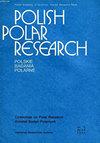Gammarus (Amphipoda) species competitive exclusion or coexistence as a result of climate change in the Arctic?
IF 0.8
4区 地球科学
Q4 ECOLOGY
引用次数: 1
Abstract
The coexistence of two congeneric amphipods, boreal Gammarus oceanicus, and arctic G. setosus, was studied during the summer seasons of 2017–2019 in the region of Isfjorden, Forlandsundet, and Prins Karl Forland island in the west-central part of the Svalbard archipelago (Arctic). Across the study area species distribution often overlapped, but the domination patterns mirrored environmental conditions preferred by each species. Both species, however, were able to survive in suboptimal conditions. On a small spatial scale (in one sample) the species were separated, which may suggest an antagonistic relationship between them. The ongoing changes in the environment of Svalbard will likely affect these two species differently. The increasing intrusion of Atlantic waters will probably favor the further expansion of G. oceanicus along the Svalbard coasts. This will be due to the gradual advance of the existing population, as an influx of individuals from the Nordic seas seems unlikely. G. setosus will remain the dominant species in cold-water areas such as the inner fjords and the northeastern coast of Svalbard and may find new suitable habitats in lagoons or estuaries fed by melting glaciers. Despite predicted changes in the distribution range of both species, their future coexistence should still be possible due to the wide range of environmental tolerance and the heterogeneity of the Svalbard coastal habitats.北极气候变化导致双足类物种竞争排斥还是共存?
本文章由计算机程序翻译,如有差异,请以英文原文为准。
求助全文
约1分钟内获得全文
求助全文
来源期刊

Polish Polar Research
ECOLOGY-GEOSCIENCES, MULTIDISCIPLINARY
CiteScore
2.00
自引率
7.70%
发文量
0
审稿时长
>12 weeks
期刊介绍:
The quarterly Polish Polar Research edited by the Committee on Polar Research of the Polish Academy of Sciences is an international journal publishing original research articles presenting the results of studies carried out in polar regions.
All papers are peer-reviewed and published in English.
The Editorial Advisory Board includes renowned scientist from Poland and from abroad.
 求助内容:
求助内容: 应助结果提醒方式:
应助结果提醒方式:


